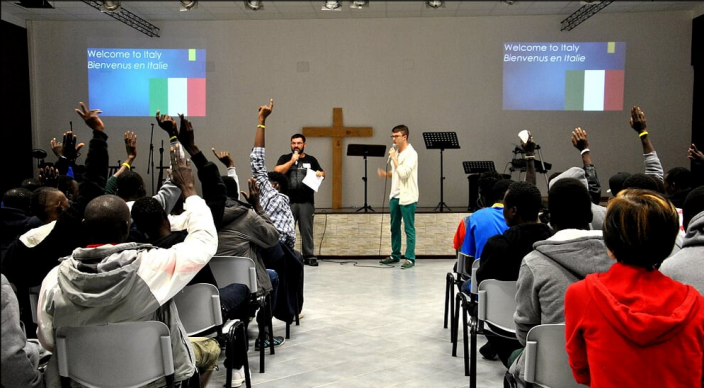7 Ways to Pray for the Refugee Crisis This Week
Christians in Austria gather to pray. Photo by TEAM
As critical needs grow in the global refugee crisis, TEAM missionaries continue to partner with the local church to welcome the nations arriving on their doorstep. This month we are sharing these testimonies and hope you will follow along on TEAM’s social media and blog.
Today, we begin seven days of dedicated prayer for global refugees and the missionaries among them. We invite you to join us and have created a daily prayer guide available for download below.
DAY 1:
Germany is expected to receive more migrants than any other country in the European Union (Source). In Dresden, a TEAM missionary partners with a local refugee resettlement group to sponsor apartments that house men from Eritrea, Syria, Iraq, Afghanistan, Tunisia and Pakistan. Thankfully, they are able to communicate with the shared language of English.
Please pray for the growing friendships between the refugees and TEAM worker. Pray that that their time together will be mutually encouraging. Please also pray for patience and endurance as this missionary helps these men navigate the difficult asylum paperwork process.
DAY 2:
Missionaries in Bologna, Italy, have interacted with hundreds of refugees over the last year through their local congregation, New Life Church. Located down the road from a dormitory that houses migrants, New Life has opened its doors wide to refugees, inviting them to Bible studies and offering translating services during the sermon. Please pray that their time in the Word together will be rich fellowship for all.

New Life Church hosts Italian language and culture learning to equip refugees for independence and success. Photo by TEAM worker in Italy
Congregants are also seeking to provide tangible assistance, like Italian language lessons, as their new neighbors integrate into Italian society. Pray for meaningful interactions as the church continues to pursue relationships with those living in the nearby dormitory.
DAY 3:
Herzwerk (Heart Factory) was launched in 2007 as holistic response to increased instances of prostitution and human trafficking in Vienna, Austria. Many of the women reached by Herzwerk are refugees from Africa and eastern Europe. Currently, six women who have escaped prostitution, but do not yet qualify for government assistance, are being assisted financially and emotionally through discipleship and mentoring.
Please pray that these women will be given a strong support system and will experience emotional healing. Please also pray against the victimization of more refugees, as their circumstances make them more vulnerable to exploitation and human trafficking.
DAY 4:
Black Forest Academy is an international Christian school in southwest Germany that serves students from 62 nations. TEAM partners with BFA to recruit teachers and staff to serve across disciplines. In response to the migrant crisis, BFA has donated one of its unused dormitories for refugee housing.

Students at Black Forest Academy bake cookies to welcome refugees in Germany. Photo by BFA
On their annual Impact Day, students worked together to prepare the dorms for new families, bake 2,000 cookies and craft 500 welcome cards to place inside each room. A teacher at BFA asks that we join her in praying that she and her students will be true witnesses of Christ’s love among those they are serving.
DAY 5:
Because of geographical proximity, France has become home to many migrants from predominately Islamic countries in north Africa. Launch is a two-year mission opportunity among this population in southern France with hands-on cultural, language and ministry training for those considering long-term ministry.
Please pray that God will call workers to this opportunity and that they will respond with obedience. Pray also for refugees in France, that they will continue to encounter believers and that their hearts will be open to the message of the gospel.
DAY 6:
Greece has experienced high volumes of refugees as many make passage through the country on route to other European Union nations. TEAM partners with Hellenic Ministries in Athens to serve migrant families through meals and access to laundry and bathing facilities. All refugees are also invited to a weekly Bible study, which for many is their first opportunity to hear and study the gospel.
We praise God that some have put their faith in Christ, and we continue to pray for the rest, who have seeds of the gospel planted within. Please pray that many more will experience salvation and in turn make disciples and establish churches wherever they go.
DAY 7:
Workers in Germany report that many of the refugee needs in their context are more emotional than material, as refugees have not received full acceptance from the German people. To help bridge the cultural divide, missionaries in Germany are leading language and custom learning programs, as well as developing a network of Christian families to regularly host refugees in their homes.
Please pray that the refugees will be able to learn key words and phrases quickly to gain more independence. Also pray that Christians in Germany will lead the way in showing hospitality.



TEAM's mission:
To partner with the global Church in sending disciples who make disciples and establish missional churches to the glory of God.
© TEAM 2023 | All Rights Reserved
Powered by
Solertiae Sites

















